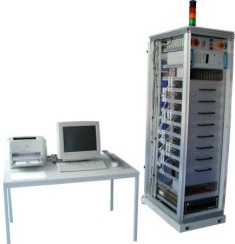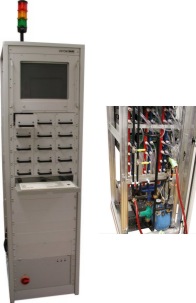
 |
|
|
Life Cycle Test & Burn-InFor our equipment for the realization of life-cycle-tests and burn-ins, we combine our skills in the field of project management, testing technolgies and construction of highly reliable systems. The tempering of the devices under test plays a major role in all these systems. In some systems, we combine the temperature control unit and the electronics for driving and measuring the DUTs to compact, modular units. This concept allows both to carry out online-measurement while stressing the DUT, and the characterization of single DUTs, without having to take them out of the system. Furthermore, this space and cost-saving design cuts down the expenses for DUT handling and also prevents the mix-up of devices as a result of frequent loading and unloading. Below we present you a small selection of our systems. Pulsed LED Degradation and Life-Cycle-Test
|
DescriptionThis station is developed for the application fields of production and quality assurance. The possible main topics are either in pre-aging the DUTs or executing life cycle tests. Both topics are realized with setting the DUTs under stress by high temperatures and high currents at definable durations and testpoints. Features and benefits
|

|
DescriptionThe main item of this system is to simulate and measure aging processes under defined conditions. These adjustable conditions are current, temperature and load duration. The duration can be up to several thousand hours. All the DUTs are measured online without un- and reloading. Features and benefits
|

|
DescriptionThe tempering of laser diodes, that have already been mounted in TO-packages is complex.
Using small, compact units, combining the temperature chamber and driver electronics, we are able to build a modular
system for the testing of several hundreds of laser diodes. Each unit can be equipped with a horde of several (e.g. 40) DUTs. |
DescriptionSystem to prove the stability of contacts under wide variations of the temperature in a range of -40 °C to 125 °C. Using peltier elements, temperature profiles cab be driven. The status of each contact can be measured online at any time. In contrast to conventional systems using two separate climate chambers, this system is able to monitor the behavior of the DUTs during the transition of temperature. |
Home | Company | Products | Download | Contact Us | Imprint | References | (c) 2003 BAUER Engineering GmbH - Last Updated: 20.03.2007 / Greger